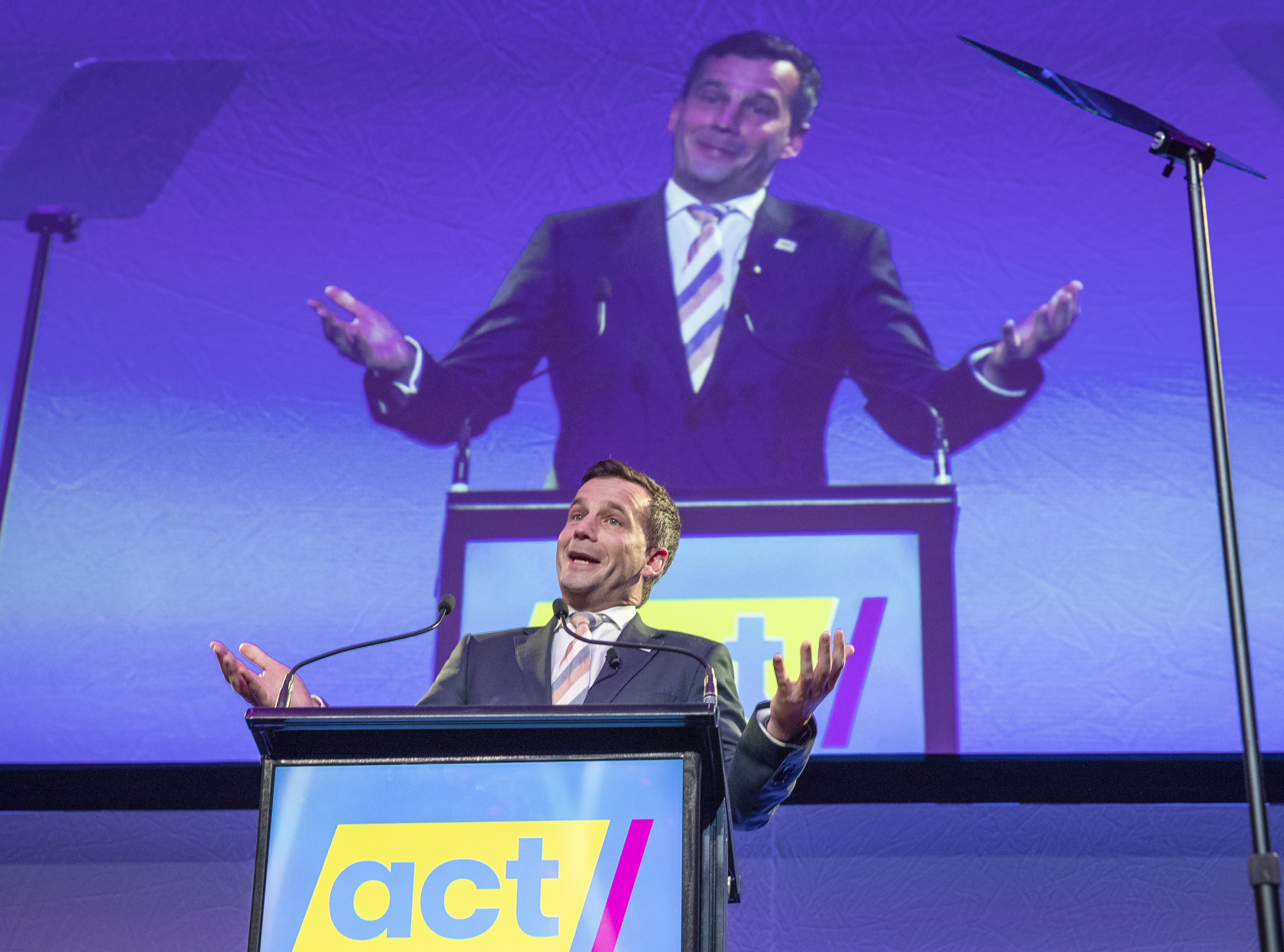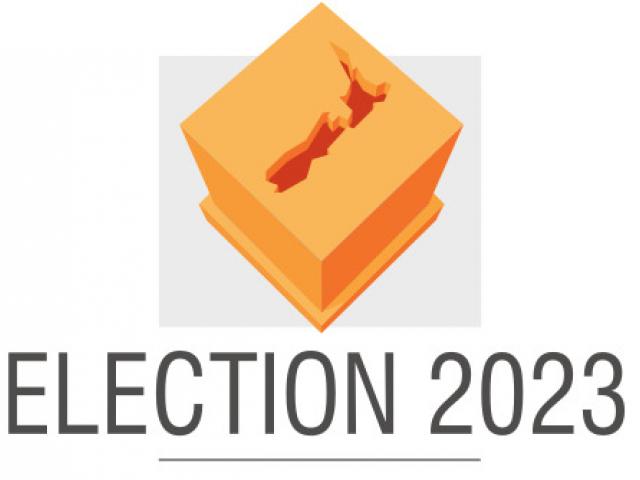
It was hard to find Act New Zealand leader David Seymour three years ago when the Otago Daily Times came calling: he was his party’s sole MP and Parliament is a big place.
It is still not easy three years on: the 2020 election brought 10 Act MPs to Parliament and the party now has a suite of offices rather than two rooms by the Parliamentary library, for Mr Seymour to hide in.
Despite the dark predictions of some, so many new MPs did not mean that Act imploded. Quite the opposite, as it turned in a disciplined and often productive three years in opposition.
The effervescent Mr Seymour is still the key to its fortunes, but Act has high hopes his deputy Brooke van Velden can win the seat of Tamaki to match Mr Seymour’s fastness at nearby Epsom, and it is polling at historic heights.
Whether Act’s good polling is due to its performance or policies or because it appeals more to undecided voters than its likely coalition partner, National, is a debatable point.

But one thing Mr Seymour has tried hard to do in the past three years is consolidate the surprising party vote strength Act enjoyed in 2020, particularly in the provinces.
The party has driven its tractor alongside the Groundswell movement, recruited former Federated Farmers president Andrew Hoggard as a candidate, and Mr Seymour has spent plenty of time in the countryside.
One of his best one-liners, regularly trotted out when he enters a rural setting, is that he is a "latte guy from Epsom". He has used it a lot in the past three years, as Act has determinedly tried to shed the perception that it is purely concerned with liberal urban interests.
"There are things that are true in Epsom that are also true out on the Otago high country," Mr Seymour said.
"In some ways they couldn’t be more different but in terms of attitude they could not be more similar. People living off the land are very exposed to price fluctuations and changes in government rules and so on, but you are all trying to make tomorrow better than it was today.
"Epsom is full of people who are in business, who are professionals who have studied and worked really hard to end up in professions that are paid well and the sense of aspiration and self-responsibility, that is true in Epsom and Tamaki and Southland."
But such alignments come with their perils. Groundswell has had to distance itself from some of the more extreme elements of its support base, and Act New Zealand’s determination to hold the government to account for its Covid response has likewise caught the attention of fringe elements. Days after we spoke, a handful of Act candidates were dropped or quit the party list after questionable social media postings came to light.
Mr Seymour maintains Act has a mainstream perspective on the pandemic, and that it probably agreed with most of the government response up until about May 2020.
"You need some ethical principles to actually lead and govern ... the positions we have taken [on Covid] have tended to be pretty orthodox," he said.
"I read the New England Journal of Medicine and I believe that the vaccine was effective and that it was safe, that it reduced peak hospitalisation and that it did a lot of good.
"Equally, I think that the way the government used ostracism as a motivator for people to get it was exceedingly unhelpful, to say the least. It was wrong, and we said it was wrong at the time."
The state took on enormous powers during the Covid crisis and exerted huge influence on people’s lives, something anathema to a small-state party like Act.
Mr Seymour believes that as New Zealand returned to normality, that led people to reconsider the level of interest the state should have in their lives.
"One thing about Covid is that it has caused a whole generation to rethink ‘is the government always right and is the government always good?’ You had about 90% of people saying that Jacinda Ardern was handling Covid well but within two years she was gone and it looks very likely that the Labour government will actually be turfed out," he said.
"I think that sets ... the scene for thinking about, well, how did a country that is pretty open and sparsely populated end up with one of the most unaffordable housing markets in the world? Why is it so hard to get roads built? How is it possible that somehow we are passing less information on from one generation to the next? Kids who went to school in the early 2000s are almost a year ahead of what is being taught in schools than kids now.
"Perhaps Covid prompted people to wonder why does the government have a monopoly on infrastructure? Why does it have such deep control over education? Why is the government regulating land use so stringently? I think those are all open to question now."
Also open to question is whether Act is ready to govern.
Should the centre right have an exceptional night, Mr Seymour — who has been particularly forceful in making sure National knows that Act is not to be taken for granted — will likely take the ministerial post he turned down to dedicate himself to getting the End of Life Choice Act passed.
As many as half a dozen of his colleagues might also anticipate receiving warrants, and Mr Seymour was confident that they were up to the task.
"If I look at our top six, seven, eight, nine candidates, you have got a pretty good team," Mr Seymour said.
"We have got to do education differently, we have got to do resource management differently, we have got to do infrastructure funding differently, otherwise we are not going to build new houses and educate the next generation."
Seymour on:
Does Act have a vote ceiling? "There probably is, but we haven’t reached it yet ... there is 15% of New Zealand which rates its chance of voting for us at 7 or higher."
Friction with National? "National was always going to have to adapt to MMP sooner or later ... our job is to bring fresh new ideas and to make sure that change is real change."
Winston Peters. "What does Winston Peters have going for him? Moral flexibility and insincerity."
Infrastructure. "The framework for creating infrastructure needs a more explicit partnership between local and central government ... central government has the funds, local government has the planning power and connection to the people."
Local issues
The new Dunedin Hospital: "I don’t know how much we can realistically do because a lot of the die will be cast, but we will certainly have a look at it."
Housing in Queenstown: "We need to get the council to build stuff quicker because it gets more money when stuff is built, and our resource management reforms would put the emphasis of development back on property owners directly."
Oamaru Hospital: "We are not that well off that we can afford to push people away if they have the skills we need in the health care system, especially in rural areas."
Tiwai Point: "They should be allowed to build their own transmission line: the original purpose of building Manapouri was to run Tiwai ... if they had thought they would be paying national transmission charges they could have built it in Whangarei."
— Tomorrow. Green party co-leaders James Shaw and Marama Davidson.












